 This will come as quite a shock, but not everyone enjoys visiting the dentist. That’s why the Moreno & Young Dental team in Bellingham make a concerted effort to ensure patients are completely comfortable in our office. We take the time to get to know our patients and offer them gentle, attentive dentistry services. However, despite our best efforts, some patients still experience dental anxiety. Other patients may need extra help remaining numb during treatment or improved comfort for advanced and complex procedures. Contact our team to find out more about sedation dentistry services to ensure complete comfort throughout your time in our office.
This will come as quite a shock, but not everyone enjoys visiting the dentist. That’s why the Moreno & Young Dental team in Bellingham make a concerted effort to ensure patients are completely comfortable in our office. We take the time to get to know our patients and offer them gentle, attentive dentistry services. However, despite our best efforts, some patients still experience dental anxiety. Other patients may need extra help remaining numb during treatment or improved comfort for advanced and complex procedures. Contact our team to find out more about sedation dentistry services to ensure complete comfort throughout your time in our office.

Soothing your anxiety at the dentist’s office can be easier than you realize. With oral conscious sedation, all you need to do is take a pill; once the effects kick in, you will be able to stay relaxed while you receive whatever treatment you need to protect the health of your smile. Oral conscious sedation can be a great choice in situations where nitrous oxide sedation isn’t enough to keep your dental anxieties under control.
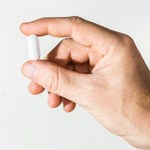
Oral conscious sedation involves the use of medication to put patients in a deep state of relaxation. It can involve various kinds of medication such as Valium, Ativan, and Halcion. When you agree to this type of sedation, you’ll be given a pill that must be taken orally before your procedure begins. After a short amount of time – often around 15 minutes or so – the medication will start to take effect.
Unlike IV sedation, oral conscious sedation does not involve any needles. And unlike nitrous oxide sedation, there will be no need to wear a mask over your nose.

When under the effects of oral conscious sedation, you will be unbothered by your surroundings, and you may even be relaxed enough to drift off to sleep (although our team will be able to wake you up simply by giving you a gentle shake). Rest assured that we will pay close attention to your condition during every step of your treatment; every once in a while, we may ask about the level of comfort that you’re currently experiencing.
One thing to note about oral conscious sedation is that the effects of the medication can linger for quite a while even after your treatment is complete. You therefore will need to rely on a friend or family member to take you home at the end of your appointment. Make arrangements to have someone keep an eye on you until the effects have fully worn off.
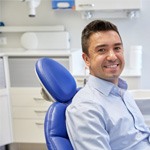
There is more than one kind of situation where oral conscious sedation can help you have a more positive dental experience. This option might be worth considering if any of the following sound familiar:
The best way to determine whether oral conscious sedation is truly right for you is to speak to our team; we’ll give you our recommendation based on careful consideration of your situation.
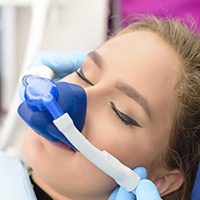
Commonly referred to as "laughing gas," nitrous oxide is a gentle sedation option ideal for patients experiencing mild dental anxiety. It’s safe for patients of all ages and effectively alleviates many common fears associated with dental visits. Whether you're due for a routine checkup, cleaning, or a simple dental procedure like a filling, nitrous oxide can induce a sense of relaxation throughout your appointment. If you’d like to learn more about this comforting solution, feel free to contact our team in Bellingham to schedule an appointment or continue reading below!
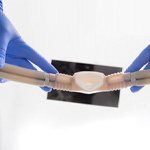
Because nitrous oxide is gentle, the vast majority of patients are eligible candidates. However, we'll need to review your medical and dental history prior to administering it. If you're pregnant or have a respiratory condition, we'll explore alternative options. On the contrary, if you experience dental anxiety, fear of needles, dental sensitivity, or similar concerns, nitrous oxide could be the solution you've been seeking!
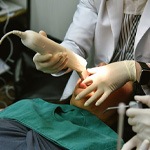
Still one of the most popular sedation options available, nitrous oxide takes effect quickly and can be easily adjusted throughout treatment to keep patients completely at ease. We’ll simply place a nasal mask, and you’ll inhale the nitrogen and oxygen combination during your procedure. Once we’ve completed your care, the nitrous mask is removed, and the effects of this sedative will quickly wear away. That means you will be able to resume your daily activities immediately following your appointment.

After the gas is turned off, its effects start to wear off right away. This means you can go back to your regular daily activities immediately after your appointment! This quick recovery is one of the top benefits of nitrous oxide, making it a great choice for patients of all ages.
Note: If you had extensive restorative or cosmetic work done, we'll provide you with aftercare instructions, such as rinsing with warm saltwater to reduce inflammation. And remember, if you have any questions about your treatment or nitrous oxide, don't hesitate to reach out to us! We're always here to help.

Intravenous sedation allows us to offer an ideal combination of the best aspects of nitrous oxide and oral conscious sedation. Like nitrous oxide, IV sedation can be adjusted throughout any procedure to ensure patients maintain their ideal level of comfort. However, IV sedatives make it possible for patients to achieve a deeper level of relaxation comparable to what is possible with oral conscious sedation. Just like patients who choose to undergo treatment with oral conscious sedation, a trusted friend or relative will need to transport patients to and from the office. Following IV sedation, we also recommend someone be present to monitor the patient’s recovery. The process is simple. We begin an IV drip, typically in the arm. Patients will begin to feel relaxed right away. Once we’ve achieved the desired level of sedation, we can begin treatment. We’ll monitor patients’ vitals to ensure their safety during the procedure, and we can make adjustments to the level of sedation at any point if patients experience discomfort.

This method of sedation is administered directly into the bloodstream. This allows you to feel the effects very quickly. You will remain conscious, but probably won’t remember anything that occurs during the procedure, as you will be in a very deep state of relaxation. Throughout the duration of your procedure, our team will closely monitor your vitals to make sure you are safe. The effects can take some time to wear off, so you should arrange to have a trusted friend or family member drive you to and from your procedure.

IV sedation is most commonly used during oral surgeries and long procedures. This can help to lessen high levels of anxiety and phobia associated with the dental practice. Additionally, IV sedation can help those who have an overactive gag reflex, TMJ dysfunction (TMD), or neuromuscular issues that could make it more difficult to keep their mouth open for a long period of time. Before your procedure, we will discuss your anxiety levels, health history, and any medications you are taking so we can rule out any possible complications.
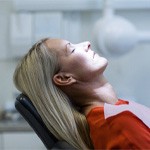
Many patients benefit from IV sedation. Here are just some of the ways it can help:

When people hear the word sedation, general anesthesiology is what they usually think of. Unlike other forms of sedation that allow patients to achieve comfort and relaxation during dental care while awake, general anesthesia renders patients completely unconscious throughout the course of treatment. To safely and effectively perform general anesthesia, a doctor needs to complete years of advanced training and education. For this reason, there are not many dental practices that offer full general anesthesia for patients. We partner with an anesthesiologist to ensure patient safety, and we’re able to perform complex procedures like dental implant placement and full mouth reconstruction without causing patients any unnecessary anxiety or discomfort. Continue reading to learn more about how general anesthesiology works.
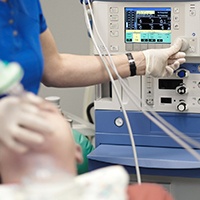
General anesthesia is used to render a patient completely unconscious during a medical procedure. To do this, a sedative is administered intravenously, so the effects will set in almost immediately. Throughout the procedure, additional doses of sedative can be administered via face mask. We will monitor your vital signs throughout the entire procedure to ensure that you are perfectly safe. Because the effects of this type of sedation linger, you will need a trusted friend or family member to drive you to and from your procedure.

General anesthesia isn’t recommended for just anybody. Some of the most common reasons for administering general anesthesia in dentistry include:
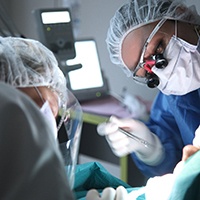
There are many benefits of general anesthesiology for dental treatment. Here are the ones that patients can experience:

There are many rumors and misconceptions surrounding sedation dentistry in Bellingham. It’s normal to have some concerns before you are ready to agree to it. Don’t worry, we will explain everything and address your apprehensions during your consultation. In the meantime, here are the answers to a few frequently asked questions to ease any anxieties.
Sedation dentistry is safe for most patients. However, your dentist in Bellingham will review your medical history and any medications you are taking to ensure you have minimal risks of complications. Our office offers multiple types of sedation to find the safest solution for you. Generally, nitrous oxide is suitable for most patients. No matter the sedative, your dental team will closely monitor your vitals at all times for your safety. Our dentists are qualified to administer oral conscious, nitrous oxide, and IV sedation.
You shouldn’t feel any pain during your procedure. You will remain conscious with nitrous oxide and oral conscious sedation; however, you won’t feel any pain. You may feel pressure, but it won’t be painful. If IV sedation is used, you’ll be unconscious, so you won’t be aware of anything going on during your procedure. It’s not unusual for a local anesthetic to be used along with a sedative, numbing the areas to keep you comfortable.
Contrary to common belief, you are not “put to sleep,” unless IV sedation is used. However, you will reach a high level of relaxation with oral conscious and nitrous oxide. You may even drift off to sleep. Your dentist can awaken you easily to respond to verbal cues. It is not uncommon for people to not have a full memory of their time in the dental chair. Depending on the sedative, it can take a few hours for the effects to dissipate. Your dentist will review your aftercare instructions based on the sedative, like arranging transportation home or limiting your activities.
While dental sedation is safe for most patients, there are risks involved for people with certain underlying health issues, like obstructive sleep apnea. Certain medications can also increase your risk of adverse reactions. Everyone handles sedation differently, which is why your dentist will take the time to learn more about your health history. The risk of complications is minimal, but you may experience temporary side effects, like headache, nausea, or grogginess. Most patients feel back to normal within a few hours, but everyone reacts differently.
Most medications used in IV or oral conscious sedation have a low likelihood of affecting breast milk. However, your dentist may recommend nitrous oxide if you are nursing because it leaves your system within a matter of minutes. It’s important to let your dental team know if you are breastfeeding to ensure nothing affects your little one negatively.